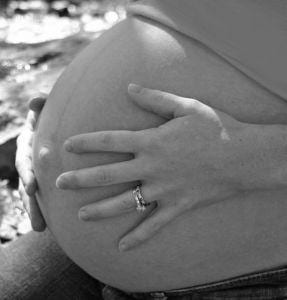Gaining weight during pregnancy is nearly unavoidable, though much of it can be attributed to carrying extra fluid in your body in addition to the weight of the baby itself. That being said, a woman who is already overweight may dread the idea of gaining extra pounds, or she may be concerned about the effect of her weight on her pregnancy and delivery. For those reasons, many women are tempted to diet while pregnant. The reasoning may seem logical, but is it safe?
Defining Diet
The term “diet” simply refers to the food we eat. One person may eat a balanced diet, another may eat a diet of junk food. Commonly, however, people use the term to describe a way of eating intended to help them lose weight. In regard to pregnancy this is an important distinction, because dieting to lose weight while pregnant is generally discouraged by doctors, but eating a healthy diet is crucial for a healthy pregnancy.
Why Dieting Is Unsafe
When people diet to lose weight, the goal is to consume fewer calories than they burn. During pregnancy, though, a woman needs to increase her caloric intake to provide adequate nutrition for her growing baby. If she does not consume enough calories or eat enough healthy foods, her baby can become undernourished, resulting in low birth weight or prematurity.
Calories During Pregnancy
During a woman’s pregnancy, she generally needs to consume 300 calories more per day than when she is not pregnant. A lot of women mistakenly believe that they can literally “eat for two,” contributing to excess weight gain. In truth, a roast beef sandwich, a light frozen entree and a grilled chicken salad are each about 300 calories. By being careful not to exceed the recommended extra 300 calories, women can help control pregnancy weight gain.
Balanced Diet
A balanced diet rich in complex carbohydrates, proteins, fruits and vegetables is essential for a healthy pregnancy. If a woman with a poor pre-pregnancy diet begins eating a balanced and nutritious diet after she becomes pregnant, she may find that she naturally loses a few pounds, particularly in the first trimester. This is generally not regarded as unsafe because the mom-to-be is getting all of the necessary nutrients to support her growing baby.
Exercise
For most women, it is both safe and optimal to include some pregnancy-friendly exercises into their routine. Not only will this help to avoid unnecessary weight gain, but it will also help strengthen muscles to make labor and delivery a little easier. Walking, swimming and low-impact aerobics are usually good choices throughout the pregnancy, but moms-to-be should consult their doctors before attempting any type of exercise.
When Weight Loss Is OK
Normal pregnancy weight gain ranges from about 15 to 40 lb. For most women, eating a calorie-sufficient and balanced diet will help to keep this gain to a minimum. In some cases, healthy eating may even result in losing a few pounds of fat. This “loss” will rarely show up on the scale as the growing baby and fluids add extra weight, but it may be reflected in the weeks and months after delivery.





